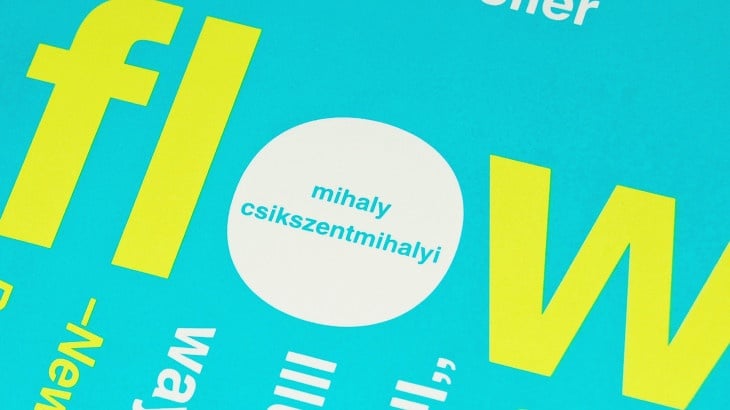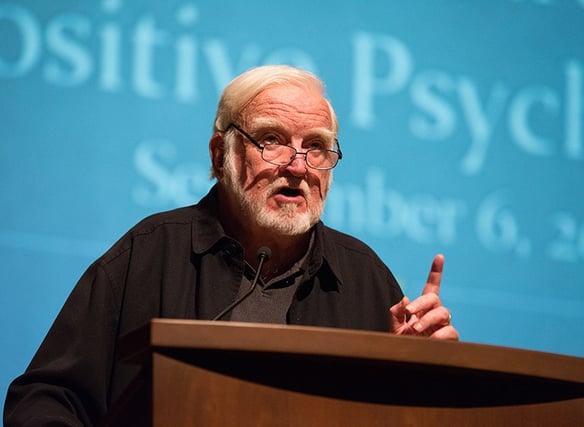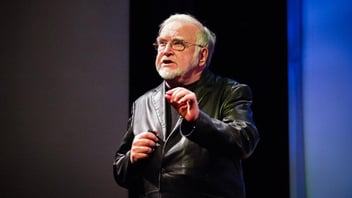The Key to Engaged Learning? An Environment that Encourages Flow

There’s life — and then there’s living a life with flow.
There’s learning — and then there’s learning what moves your spirit.
There are prominent psychologists — and then there is Dr. Mihaly Csikszentmihalyi.
In December 2017, EXPLO was beyond delighted to announce that Dr. Csikszentmihalyi — the world’s leading researcher on positive psychology and the pioneer of Flow — agreed to be an EXPLO Advisor.
Dr. Csikszentmihalyi describes flow as the “optimal state of consciousness where we feel our best and perform our best.” In this state you are completely engaged in the activity. Time flies. “Your whole being is involved, and you’re using your skills to the utmost.” Finding your state of flow happens when you can explore a multitude of interests, sharpen your skills, and act on your curiosity to pursue new challenges. We recently chatted with Dr. Csikszentmihalyi about his research — and how learning to practice flow early in life leads to more engaged learning, self-confidence, and a life driven by meaning and purpose.
A Childhood of Purpose and Meaning
A life centered on flow is one filled with purpose and meaning, and it starts in childhood. According to Dr. Csikszentmihalyi, children and adolescents who are encouraged to cultivate the practice of flow early on will “grow up feeling much more self-confident, looking forward to life.”
“The child who grows up discovering that they can do things and that the challenges are worth taking is going to grow up to be more productive, and not just for themselves, but for the family and the community in which they live.
“Flow is a way of liberating or freeing the energy that children have instead of constraining them to go into predetermined channels where they are not sure why they have to do what they have to do.”
Flow Promotes Engagement
Dr. Csikszentmihalyi believes more schools need to be doing the work of encouraging student voice and agency in order to promote deeper engagement with what they are learning. He acknowledges that this is hard to do on a large scale, given how deeply entrenched the traditional pedagogy is.
“The history of education shows that schools were developed in the 19th century with compulsory education which was based on adopting the methods of mass production that started in factories. There, you put a piece of metal on at one end, and a car comes out the other end. So the idea was that you put a child in at one end, and at the other end will be this well trained scholar. And that’s not how it works with people.”
How Flying Saucers Led to Flow

Hungarian Csikszentmihalyi’s formative years were shaped by the upheaval and trauma of World War II: “What I experienced was the fact that the world was this hard place to live in, it was impossible, but if you tried your best and you were lucky than you could survive and even prosper in it.
As he set out into the world with the goal of understanding how to live a better life, Dr. Csikszentmihalyi tried studying (“wasn’t much interested”). He went rock climbing (learned a lot about persistence). Then one summer in Switzerland, he came upon a free talk about flying saucers.
“The guy had a completely weird way of introducing flying saucers. In Hindu mythology, the unity of the world is represented by something like a flying saucer. The flying saucer was representing the collective unconscious of society and trying to find meaning in the world again.”
“The guy,” it turned out, was prominent Swiss psychologist Carl Jung — and Dr. Csikszentmihalyi still attributes some of his early interest in psychology to that fateful talk he stumbled upon.
The important thing is to find out what works for you. Until then, it is best to try as many settings as you think you might like, until you find your sweet spot.
The Flow Channel: Where Challenge and Skill Intersect
Dr. Csikszentmihalyi’s work focuses on finding the spot where challenge and skill meet to create a state of flow. If an assignment, task, or project is not challenging, our brains become disinterested or bored; if our skill set doesn’t match the level of expertise that the challenge requires, we can become discouraged or overwhelmed. When you enter into a state of flow, the challenge of the work you are doing is matched by your own mastery of a skill set.
“It all depends on the activity being pursued, and the person who pursues it. One thing you can do is keep a diary, and track the best and worst parts of your day. After you do that for a couple of weeks, you sit down and look for patterns. Is there anything in common? You think about how to transfer the lows into at least normal and how to transfer the normals into highs. In other words, you ask yourself: ‘How do I do more of what makes me feel good?’”
Individual Pursuits that Benefit Community
As Dr. Csikszentmihalyi describes it, flow is like “a form of systematic self-therapy”. You track what you are doing that makes you feel good, and what doesn’t, and from there, you take action and make changes. “This can involve actually changing what you do, how you do what you do, or how you interpret what is happening,” Dr. Csikszentmihalyi says. “But it’s based on your own evaluation of first becoming aware of what you’re doing and how that makes you feel.” It involves intentionally seeking out the things that make you happy.
A focus on individual happiness — on making intentional choices to play to people’s interests and strengths — can also positively transform the community. Dr. Csikszentmihalyi notes that well known companies, including LG and Patagonia, have implemented flow in their workplace and reported astounding results both in terms of employee happiness and overall company performance.
Finding Your Flow: Big Waves, Steep Slopes, Small Spaces
Finding flow is a lifelong practice, and that practice is maximally beneficial if it begins in childhood, Dr. Csikszentmihalyi says. But it’s a practice that requires exploration and learning environments that offer the flexibility and support to cultivate curiosity.
“People who get flow from surfing need big waves, and those who get it from skiing steep slopes; but there are people who prefer to think and write in small spaces, surrounded by familiar books and furniture. The important thing is to find out what works for you. Until then, it is best to try as many settings as you think you might like, until you find your sweet spot.”



